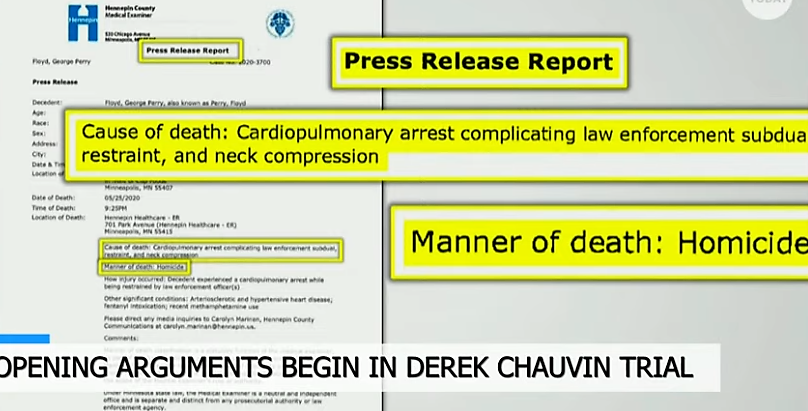What Caused the Death of George Floyd? Q & A

Isn’t the cause of death obvious?
Most people who viewed all or portions of the Floyd arrest video likely assume that Chauvin’s pressure on the neck of George Floyd led to his death by asphyxiation. Floyd is heard on the video repeatedly saying, “I can’t breathe.”
One of the complicating factors is that pressure on the neck causes not only interference with breathing, but also affects large and important veins and arteries in the neck that can lead to a disruption of blood circulation and potentially cause cardiac arrest. A lack of oxygen can also damage or kill the heart muscle, triggering an abnormal electrical signal that can cause sudden cardiac arrest. A knee on the carotid artery can cause a fatal asystole, other arrhythmia, or a fatal stroke. Also, of course, prolonged respiratory arrest will eventually lead to cardiac arrest.
The Hennepin County Chief Medical Examiner Andrew Baker announced his conclusion that George Floyd died not of asphyxiation, but “cardiopulmonary arrest.” In Baker’s opinion, based on the results of his autopsy, Floyd’s medical condition placed him at a higher than usual risk for death or serious injury when subjected to neck pressure. In other words, most suspects, subjected to the same knee pressure as Floyd, probably wouldn’t have died. In particular, Baker noted a thickening and hardening of Floyd’s artery wall, heart disease, and drug use (fentanyl and methamphetamine were found in Floyd’s system) as “significant conditions” contributing to Floyd’s death. Nothing, however, in Baker’s report suggests that the restraint and neck compression applied by Officer Chauvin were not “but-for” causes resulting in Floyd’s death. That is, had the restraint and neck compression not been applied that night, George Floyd would still be alive. Ultimately, Baker ruled the death a homicide.
Some of Examiner Baker’s conclusions were disputed by attorneys for the Floyd family, who commissioned a second autopsy. The private autopsy found that Floyd, plainly and simply, died of asphyxiation.
Why is the cause of death central to the trial?
The Floyd trial is not primarily about race. The prosecution need not prove, nor will attempt to prove, that Officer Chauvin’s actions were in any way racially motivated. Racial bias is not an element that need be proved to substantiate a charge of murder or manslaughter. But it is necessary for the prosecution to prove that the defendant’s actions substantially caused the victim’s death.
The Floyd trial Judge Peter Cahill noted the centrality of the cause of death issue. He said, “Clearly there is a cause of death issue here — in fact, it is highly contested.”

Does the prosecution have to prove that Chauvin’s actions alone caused Floyd’s death?
No. The jury instructions state that the prosecution only need prove that Chauvin’s actions were “a substantial causal factor in causing the death” and that “the fact that other causes contribute to the death does not relieve the defendant of criminal liability.”
What is the defense’s view of the cause of death?
Chauvin’s attorneys argue that Floyd died because of a drug overdose and his other underlying heart issues. In a court filing, attorney Eric Nelson wrote, “Put simply, Mr. Floyd could not breathe because he had ingested a lethal dose of fentanyl and, possibly, a speed-ball.” He pointed to Baker’s findings that no bruises were found on Floyd’s neck and back as proof that his client did not cause Floyd’s death. At a minimum, Floyd’s attorneys contend, there is reasonable doubt as to whether the actions of Derek Chauvin “substantially” contributed to Floyd’s death. Whatever role the neck pressure played in leading to Floyd’s death was minimal. If the jury has a reasonable doubt as to whether Chauvin’s actions substantially caused Floyd’s death, the jury must acquit.
What is the prosecution's view of the cause of death?
The prosecution argues that the cause of death was aphixiation. They point out that Floyd's heart appeared normal in the autopsy. They argue that the cause of death could not be arrythmia, which would have caused instant, not a prolonged death. They also argue that the amount of fentanyl in Floyd's body, while sufficient to be a fatal dose for some, could not have caused Floyd's death because he had, through a long period of use, established a high tolerance for the drug.
